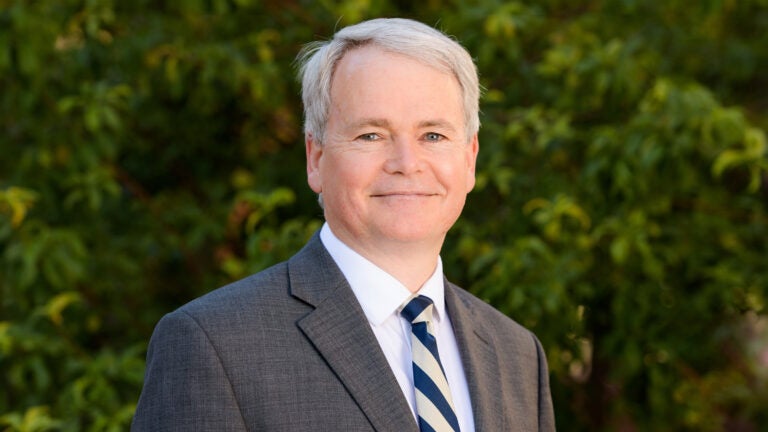
Environmental justice leader Christopher Boone will join USC after decades of impactful work supporting the growth of sustainability programs. (Photo/Courtesy of the Arizona State University Provost’s Office)
Global sustainability pioneer named dean of the USC Price School of Public Policy
Christopher Boone joins USC Price after decades of work supporting the growth of sustainability programs in colleges and universities across the country.
Sustainability pioneer Christopher Boone has been named dean of the USC Price School of Public Policy. An international expert in urban sustainability, global environmental change, urbanization and environmental justice, Boone will hold the C. Erwin and Ione L. Piper Dean’s Chair at USC Price beginning Jan. 1.
The environmental justice leader joins USC after decades of impactful work supporting the growth of sustainability programs in colleges and universities across the country.
“Chris Boone brings great depth of experience and expertise in areas of vital importance to the Price School and to USC, including sustainability, national policy and global challenges,” USC President Carol Folt said. “He is an expansive thinker and experienced leader who will hit the ground running with vision, strategy and a strong focus on continued excellence and leadership by Price faculty, staff and students.”
Boone spoke of his excitement to join a university whose senior leadership embraced sustainability as a high-priority field of study. His ambitions are in line with Folt’s Sustainability “moonshot,” which aims to ensure the university remains at the forefront of sustainability operations, research and education through interdisciplinary collaboration and innovative approaches to complex challenges.
“President Folt’s commitment to engaging people on sustainability efforts from across all parts of the university, from operations to academics to research, as one of the moonshots made this a very attractive proposition for me,” Boone said.
Building from the ground up
Boone, who currently serves as a professor at Arizona State University’s School of Sustainability, has held a variety of positions at ASU during his 18-year tenure, bringing an interdisciplinary approach to innovation within that field of study. As the founding dean of the university’s College of Global Futures from 2020 to 2021, he established a new college by combining the existing School of Sustainability and the School for the Future of Innovation in Society and created a new School of Complex Adaptive Systems. In this role, he oversaw more than 200 faculty and staff members and 2,000 students. He also launched a Justice, Equity, Diversity and Inclusion working group for the college.
“I’ve described this experience to people as both liberating and terrifying — liberating in the sense that we weren’t beholden to old ways of doing things, and terrifying in the sense that we knew that we had to get it right because others were watching what we were doing and were curious to learn how we were going to help support this new and evolving field,” Boone said.
As dean of ASU’s School of Sustainability from 2013 to 2020, he provided leadership to 621 majors and more than 2,800 students in various sustainability programs and maintained the highest freshman retention rates on campus through the recruitment of high-caliber faculty and staff.
He also developed a love of fundraising, a passion he hopes to reignite in his new role at USC.
“It gives you a chance to work with alumni and outside partners and try to find where you can get a mission match between what the school is trying to achieve and what the donors are looking for,” Boone said. “That’s kind of a fun puzzle to figure out — and when people decide to give, I can tell you personally that it’s a very joyful moment for them.”
A global leader in sustainability efforts
For more than a decade, Boone has held numerous roles that have had an impact on sustainability issues worldwide, including as a board member for the Global Council for Science and the Environment, which is dedicated to advancing the scientific basis for environmental decision making, and as a member of the scientific steering committee of the Urbanization and Global Environmental Change program.
As an executive committee member for the Tyler Prize for Environmental Achievement, a global award administered by USC, he has also aided in the review of nominations to select the Tyler Prize laureate and advance the goals of the prize.
Boone also served as a co-principal investigator for two Long Term Ecological Research (LTER) programs: the Baltimore Ecosystem Study and the Central Arizona–Phoenix LTER. He has also held more than a dozen academic appointments at schools including Georgetown University, Yale University, Ohio University and California State University, Los Angeles. He has authored and co-authored three books, 21 book chapters and 56 journal articles. His scholarship has been supported with 62 research grants totaling $40 million.
Boone also co-founded the National Sustainability Society, which convenes colleges and universities with individuals from the public, private and nonprofit sectors to discuss how to move the needle on sustainability issues. After also serving as the president of the organization, he’ll hand off the baton ahead of his new role in January.
“We are excited for Christopher’s innovative and forward-thinking spirit, expertise in sustainability and public policy, and excellence in leadership that he will bring to our community and into the future,” said USC Provost Andrew T. Guzman, senior vice president for academic affairs.
Falling in love with cities
It was during Boone’s work on the Baltimore Ecosystem Study that he fell in love with an “interdisciplinary way of knowing about the world.” The project involved a collection of experts from different disciplines trying to figure out how Baltimore functioned as a “human ecosystem,” working with city, county and local nonprofit leaders to improve the well-being of people in the region.
“I’ve always been interested in urbanization, and I love cities,” Boone said. “Moving back to L.A. will be a real treat in that sense.”
Boone earned his Bachelor of Arts degree in geography from Queen’s University in Canada in 1987 and his master’s degree and doctorate in the same subject from the University of Toronto.
Boone, who is originally from Canada, expressed his excitement to join the Trojan Family and move back to L.A. at such an exciting time for the city.
“I fell in love with the city when I was a faculty member at Cal State Los Angeles because of the energy and the diversity,” Boone said. “The whole world is in L.A., and people pay attention to what happens there — especially as the city figures out solutions to complex problems that can not only improve the well-being and environment for L.A., but also have a ripple effect on cities around the world.”
He cites the upcoming FIFA World Cup in 2026 and the 2028 Summer Olympic and Paralympic Games as prime examples of how L.A. — in partnership with interdisciplinary sustainability experts at USC Price and beyond — can influence how cities address complex problems while improving and protecting the lives of their inhabitants.
“At this stage of my career, I want to tackle the complex, difficult, challenging problems,” Boone said. “Being able to draw on all those different knowledge sets — all those methodologies, theories and ways of knowing — allows you to translate that interdisciplinarity into solutions, and that is very attractive to me.”
Building a sustainable future
Boone described sensing USC’s “intense interdisciplinarity” long before accepting his new position. “Even from the interactions I’ve had with faculty, staff and students, it’s not just a word — it seems to be fundamental to the practice of how the school operates,” he said.
He hopes to engage with external partners and people from across the university’s campuses to think about how to build urban centers and retrofit urban designs to create ways for cities to meet global sustainability goals.
“The fact that I’m coming to a new institution is exciting in itself — the fact that it’s USC in particular, with all the qualities that I spoke of, makes it particularly intriguing,” Boone said. “I’m excited about meeting all my new colleagues and students and figuring out all the amazing expertise in the staff in the school. It’s all going to be really exciting and fun.”



